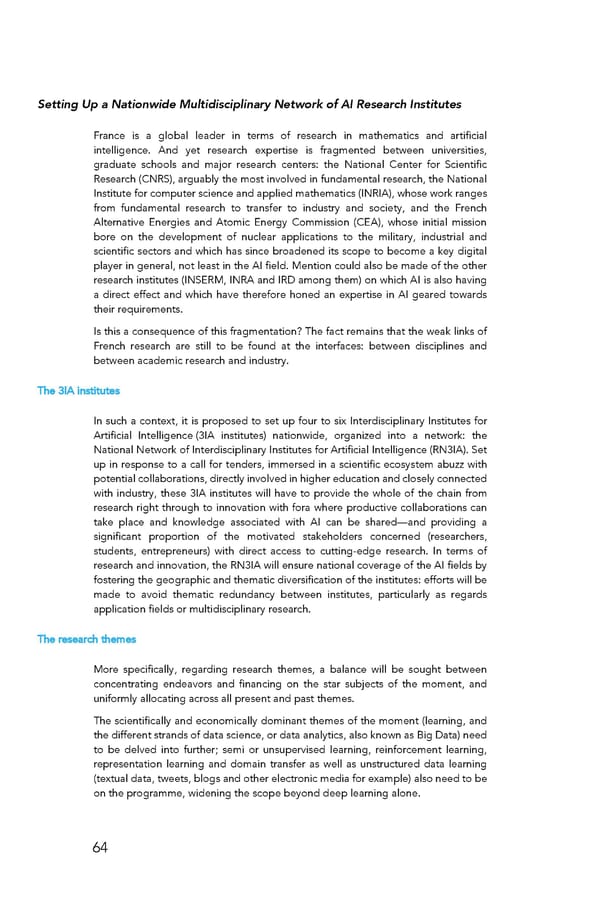Setting Up a Nationwide Multidisciplinary Network of AI Research Institutes France is a global leader in terms of research in mathematics and artificial intelligence. And yet research expertise is fragmented between universities, graduate schools and major research centers: the National Center for Scientific Research (CNRS), arguably the most involved in fundamental research, the National Institute for computer science and applied mathematics (INRIA), whose work ranges from fundamental research to transfer to industry and society, and the French Alternative Energies and Atomic Energy Commission (CEA), whose initial mission bore on the development of nuclear applications to the military, industrial and scientific sectors and which has since broadened its scope to become a key digital player in general, not least in the AI field. Mention could also be made of the other research institutes (INSERM, INRA and IRD among them) on which AI is also having a direct effect and which have therefore honed an expertise in AI geared towards their requirements. Is this a consequence of this fragmentation? The fact remains that the weak links of French research are still to be found at the interfaces: between disciplines and between academic research and industry. The 3IA institutes In such a context, it is proposed to set up four to six Interdisciplinary Institutes for Artificial Intelligence (3IA institutes) nationwide, organized into a network: the National Network of Interdisciplinary Institutes for Artificial Intelligence (RN3IA). Set up in response to a call for tenders, immersed in a scientific ecosystem abuzz with potential collaborations, directly involved in higher education and closely connected with industry, these 3IA institutes will have to provide the whole of the chain from research right through to innovation with fora where productive collaborations can take place and knowledge associated with AI can be shared—and providing a significant proportion of the motivated stakeholders concerned (researchers, students, entrepreneurs) with direct access to cutting-edge research. In terms of research and innovation, the RN3IA will ensure national coverage of the AI fields by fostering the geographic and thematic diversification of the institutes: efforts will be made to avoid thematic redundancy between institutes, particularly as regards application fields or multidisciplinary research. The research themes More specifically, regarding research themes, a balance will be sought between concentrating endeavors and financing on the star subjects of the moment, and uniformly allocating across all present and past themes. The scientifically and economically dominant themes of the moment (learning, and the different strands of data science, or data analytics, also known as Big Data) need to be delved into further; semi or unsupervised learning, reinforcement learning, representation learning and domain transfer as well as unstructured data learning (textual data, tweets, blogs and other electronic media for example) also need to be on the programme, widening the scope beyond deep learning alone. 64
 For a Meaningful AI - Report Page 64 Page 66
For a Meaningful AI - Report Page 64 Page 66